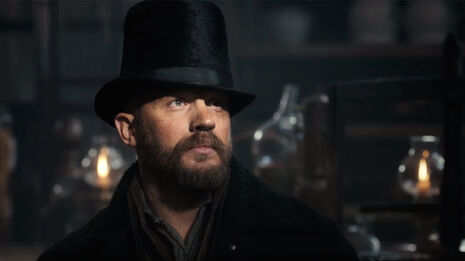TV Round-Up: Taboo (Part Two)
Episodes 3 and 4 live up to the series’ name. Shame about all the secrecy, though…

Tom Hardy’s disturbingly dark Taboo is truly beginning to live up to its name. These latest instalments develop this gothic tale about the underworld of Georgian society and intensify it to an even greater level than the previous episodes. Although the first two episodes were intriguing, I did not believe that Taboo could exceed beyond what was already proving to be a ‘fairly successful’ drama. I have been proven wrong.
The third and fourth episodes give a deepened insight into the grisly world introduced in the first two. Nothing is left uncovered as Hardy refuses to paint a picture of Georgian London through rose-tinted glasses. As if by force, he constantly draws our attention to a power-hungry and morally corrupt society, where the establishments of authority and the family unit are twisted. He violates the characters’ most confidential moments, and in turn creates the impression of ‘taboo’.
“Separated by land but tied by paternal blood and lust for each another, the siblings represent the idea that the morality of man cannot be distinguished by society or ethnicity”
Taboo has improved in many ways. James Delaney has become a convincing protagonist, more so than at the beginning when his mystique threatened to unbalance of the story. He is now the perfect anti-hero, no more than the lesser of two evils, the other evil being the East India Company. It is Delaney whom we crave to see the most each episode. This has been achieved through provoking scenes that reflect his disturbed psyche. A lavish party in episode four is shown through Delaney’s eyes as a savage world of manic laughter and orgies, ironically made up of the people who insist that their society is more civilised than Nootka Sound’s. Clearly Hardy’s initially questionable take on the topic of race and the East India Company is in fact an intelligent one.

This astute perception is suggested further through the incestuous relationship of Delaney and his half-sister Zilpha. Separated by land but tied by paternal blood and lust for each another, the siblings represent the idea that the morality of man cannot be distinguished by society or ethnicity. While Zilpha declares herself a victim of witchcraft and now a woman of God, her illicit yearning for Delaney refutes any idea that her society is superior. Contrastingly, Lorna is suspected to be nothing more than a devious actress, but she refuses to sacrifice her dignity by becoming a courtesan. Both women differ from society’s expectations, and so Hardy calls for his audience to look beyond the surface that he portrays.
Nonetheless, Taboo is not without its faults. The progress of the plot is slow at times, particularly in relation to Nootka Sound and Delaney’s mother. The lack of information disclosed about this part of the story makes it almost feel irrelevant, when it is, in fact, at the very core of the plot. However, with another four episodes to go, there is still sufficient time for this to be developed – it is time for Hardy and Knight to do so.
Taboo is proving to be a story of many layers with resonances for a modern audience. Through fact alone, we often fail to grasp the real nature of historical issues: dramas rich with intriguing characters and stimulating mises-en-scène allow us to question the world of our ancestors and even the world we live in now. Providing Hardy keeps up the good work in the second half of the series, Taboo should end as a success
 News / Clare Hall spent over £500k opposing busway 24 December 2025
News / Clare Hall spent over £500k opposing busway 24 December 2025 Comment / The ‘class’ of Cambridge24 December 2025
Comment / The ‘class’ of Cambridge24 December 2025 News / Caius mourns its tree-mendous loss23 December 2025
News / Caius mourns its tree-mendous loss23 December 2025 Comment / Yes, I’m brown – but I have more important things to say22 December 2025
Comment / Yes, I’m brown – but I have more important things to say22 December 2025 News / Girton JCR publishes open letter expressing solidarity with Palestine25 December 2025
News / Girton JCR publishes open letter expressing solidarity with Palestine25 December 2025









